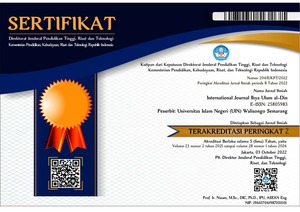SANKSI TINDAK PIDANA KORUPSI DALAM PERSPEKTIF FIQIH JINAYAT
DOI:
https://doi.org/10.21580/ihya.17.2.1735Keywords:
Criminal Actions, Corruption, Fikih Jinayat, Sanctions, Ta'zirAbstract
Islamic Shari'ah functioned by God as a deterrent to evil. Jurisprudence of Jinayat in Islamic law recognizes three kinds of punishment for a crime committed by a person; Qishah, hudud and ta'zir. The determination of punishment is not merely a revenge, but rather a goal to create a deterrent effect or shock to create a calm and peaceful society situation as the message contained in the word hayah which means a peaceful life. This paper aims to reveal the concept of punishment in the crime of corruption in the eyewear of Jinayat jurisprudence. Through literature review it can be concluded that the sanction of corruption is ta'zir, which is adjusted with the judge's decision based on the level of corruption that has been done. Sanctions in the form of ta'zir vary from mild to severe enough to recall corruption with a complex social impact. The ta'zir sanctions that can be given to the perpetrators of corruption are; Imprisonment, defamation, material fines to death penalty.---
Syariat Islam difungsikan Allah sebagai pencegah kejahatan. Fikih Jinayat dalam syariat Islam mengenal tiga macam hukuman atas kejahatan yang telah dilakukan oleh seseoorang; qishah, hudud dan ta'zir. Penetapan hukuman tidak hanya sekedar pelampiasan dendam, namun lebih pada tujuan untuk menimbulkan efek jera atau shock terapy agar tercipta situasi masyarakat yang tenang dan damai sebagaimana pesan yang terkandung dalam kata hayah yang artinya kehidupan yang damai. Tulisan ini bertujuan untuk mengungkap konsep hukuman dalam kejahatan korupsi dalam kacamata fikih Jinayat. Melalui kajian literature dapat disimpulkan bahwa sanksi tindak pidana korupsi adalah ta’zir, yaitu disesuaikan dengan keputusan hakim berdasarkan kadar korupsi yang telah dilakukan. Sanksi berupa ta’zir ini beragam dari yang ringan hingga yang cukup berat berat mengingat korupsi membawa dampak sosial yang kompleks. Sanksi ta’zir yang bisa diberikan kepada para pelaku korupsi adalah; penjara, pencelaan, denda materi hingga hukuman mati.
Downloads
References
Abdul Ghafur, Waryono, Tafsir Sosial, Diva Press Yogya, cet 1, 2001
Ali, Atabik, Kamus Kontemporer, penerbit Krapyak, cet 8 1998
Asy’ari,Musa dkk,editor,Menuju Masyarakat Anti Korupsi, Serial Khutbah Jum’at, ,
Departemen Komunikasi dan Informatika, cet 1, 2005
Azizy, Qadri, Eklektisme Hukum Islam, Gama Media, Yogya, cet 1, 2002, 39
Budi Utomo, Setiawan, Fiqih Aktual, GIP, Jakarta cet 1, 2006
Haroen, Nasrun, dkk, Ensiklopedi Hukum Islam PT Ichtiar Van Hoeve,jilid 3, cet 1,Jkt 2001
Irfan, Nurul, Tindak Pidana Korupsi dalam fiqih Jinayat (Disertasi program doktoral UIN Syarif Hidayatullah) Jakarta, Balitbang Depag, cet 1 2008
Jazuli, Ilmu Fiqih, Prenada Media, cet 5, 2005
Muslich, Wardi, Fiqih Jinayat, Sinar Grafika, cet 1, 2004 Jakarta
Rasyid, Sulaiman, Fiqih Islam,PT Sinar Baru Algesindo, cet 39 tahun 2006.
Rofiq, Ahmad, Hukum Islam di Indonesia, Raja Grafindo, cet 6, 2003,4
Sabiq, Sayyid, Fiqhussunnah, Darul Fikr, Beirut, cet 1, 1992.
Santoso, Topo, Membumikan pidana Islam, GIP Jakarta, cet 1, 2003
Syathibi, Imam, Al-Muwafaqat, Darul Kutub Al-Ilmiyyah,Beirut jilid 2, 1998.
Utaibah, Bahjat, Alfiqh Aljinaaiy Al-Islamy, ,Departemen kajian Islam,Mesir cet 1, 2000.
Website: http/www.imamsuprayogo.com/membudayakan shalat berjama’ah
Downloads
Published
How to Cite
Issue
Section
License
By submitting an article to the journal, the author(s) agree to transfer the published article's copyright to the journal, which will act as the publisher. This means the journal will have the right to publish the article in various forms, including reprints. The journal will maintain the publishing rights to the published articles.
This work is licensed under Creative Commons Attribution-ShareAlike 4.0 International License.
In line with the license, authors and third parties (readers, researchers, and others) are allowed to share and adapt the material. In addition, the material must be given appropriate credit, provided with a link to the license, and indicated if changes were made. If authors remix, transform or build upon the material, authors must distribute their contributions under the same license as the original.



